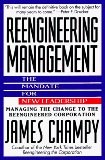|
The Mandate for New Leadership

Thanks to James Champy and Michael Hammer, reengineering will remembered as the business buzzword of the 1990s.
In Reengineering the Corporation, they showed how companies could dramatically improve performance by delegating responsibility
and authority throughout the enterprise--to the sales clerk, the shipping manager, the customer-service representative. And,
indeed, most companies that took up the banner of reengineering saw dramatic improvements. But not to the degree that Champy
thought possible. Unfortunately, management, which made reengineering possible in the first place, was the same group that
was limiting its potential. Champy writes:
Anything less than a fundamental revolution in actual management practice, we discovered, is like a communist
regime introducing free enterprise into a controlled economy while trying to hold on to power. It can be done for a while,
but no one supposes that such an arrangement can last. Something's gotta give, and history shows that it's not going to be
free enterprise. It has to be management. If management doesn't change, reengineering will be stopped in its tracks. In
Reengineering Management, Champy discusses the challenges managers face in trying to function in the reengineered workplace.
At the heart of the manager's dilemma is the loss of authority and control, which in the new workplace must be delegated.
Champy looks at how managers from a wide range of companies, including Federal Express, Frito-Lay, and AT&T, have stepped
"out of the boxes on the organizational chart" and wrestled with the hard issues of leadership, values, and culture while
at the same time dealing with a marketplace whose only constant is change itself. Wise, well written, and articulate, Reengineering
Management is required reading for any manager looking to engineer a revolution of his or her own. --Harry. C. Edwards
From Library JournalChampy, coauthor with Michael Hammer of Reengineering the Corporation: A Manifesto
for Business Revolution (HarperBusiness, 1993), is chair of CSC Index, the management consulting firm that pioneered the idea
of "reengineering," i.e., redesigning a company's operations, design, and culture to improve performance. Reengineering has
been adopted by hundreds of firms, and examples from them are incorporated into this handbook, allowing the author to show
how the reengineering process too often stops at the upper levels of the organization and does not filter down throughout
the firms. Each chapter is followed by examples from firms that have implemented the reengineering concept. While not as revolutionary
as the earlier volume, this is a worthy supplement to it that examines significant additional experiences with the reengineering
concept and further develops it for all levels of management. Anyone implementing any aspect of reengineering should have
this book, and libraries (public, academic, and special) should too.?Littleton M. Maxwell, Business Information Ctr., Univ.
of Richmond, Va.
|
|
p.30 Reengineering is a particular way of using our minds, of minding
our businesses, and anyone can learn it. It's a way of radical experimentalism, of invention and reinvention, constantly
checked by the realities of the bottom line.
p.49 the only way to persuade many folks to undertake a painful therapy like reengineering, followed by
a permanent state of mobilization, is to persuade them that the alternative will be even more painful.
p.122 Reengineering's great contribution to the management process of measurement has been to help
keep the accountancy focused on what really matters for the business. It is ultimately in terms of results for customers
- their pleasure and/or pain - that we can measure a company's performances, whether people's, products', or processes'.
p.123 But now, as we rethink our purpose, define new ambitions, and look to radically improve our key business
metrics, we must identify the process results we want to measure that will accurately predict our business performance.
And we must focus the whole organization on these key process results.
The failure of the "machine" model of the corporation is partially a failure of measurement focus.
p.196 Be careful to keep the performance measures clear and simple so that there is no misunderstanding
about your objectives.
|
 |
|
|
 |
|
|
 |
|
|
|

